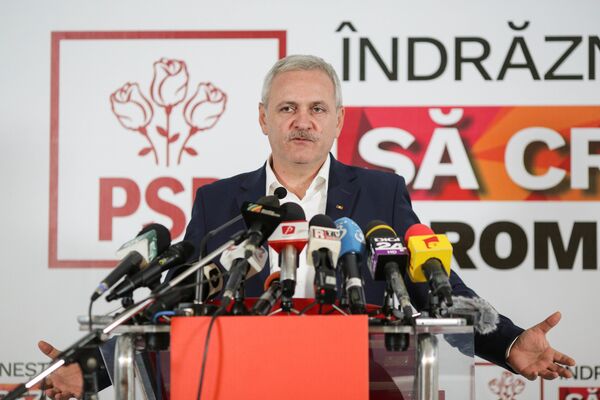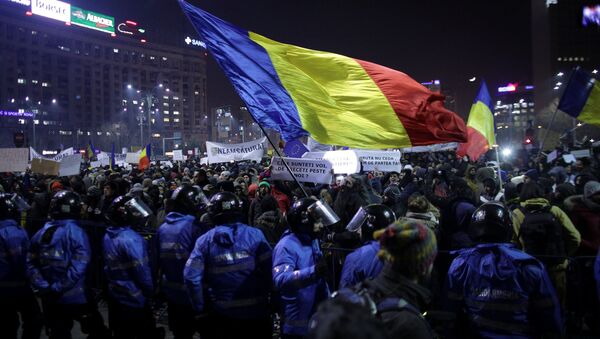The measures, adopted January 31, decriminalize cases of official misconduct in which financial damage is valued at under 200,000 Romanian lei (US$47,683). Romania's government, elected December 2016, alleged the move was necessary in order to get the country's criminal code in line with constitutional court rulings.
The measures include pardons for convicts sentenced to less than five years and reduced sentences for prisoners over 60. They will likely result in the release of at least 2,500 convicts, ostensibly to ease prison overcrowding.
However, critics claim the measures are designed to protect ruling Social Democratic Party chairman Liviu Dragnea, who faces legal actions for around half that figure.

Dr. Liliana Pop, an expert on Romanian politics, told Sputnik the ruling Social Democratic Party have gravely misjudged public sentiment.
"The party received electoral support in the elections in December on a promise to make the state more responsive to the needs of the impoverished and to increase investment in public services — it was not an endorsement of corrupt behavior among them," Dr. Pop told Sputnik.
Tens of thousands of protesters took to city streets across Romania after the laws were passed, chanting anti-government slogans. Some yelled "you did it at night, like thieves," in reference to the government's passing of the law in the late hours.
"I am delighted with the size of the demonstrations. I hope there will be enough vigorous internal debate within the SDP to force out corrupt politicians who cannot carry out their job responsibilities due to their legal problems," Dr. Pop added.
100.000+ on the streets of Bucharest. 100.000+ in other cities in the country. The biggest protest in the last 25 years #Romania #Corruption pic.twitter.com/71Eg23BER6
— Daniel Rascol (@rdrascol) February 1, 2017
They thought passing the pardon law at 10.30 pm would go unnoticed. They thought wrong. #romaniaprotest #anticorruption #bucharest #resist pic.twitter.com/75OE0cEa0m
— Sabina Ciofu (@SabinaCiofu) January 31, 2017
"These events have worried the entire country and the world. They are the result the lack of a public debate and the means used to adopt certain law changing measures, as well as the misuse of the anticorruption message and sincere indignation of some citizens groups for political purposes," said Iulia Cospanaru, adjunct director at Transparency International Romania.
"The way the Government passed these decrees — late at night, after a quick consultation, during the a meeting dedicated to the State budget — violated the customary standards of good governance, transparency, and predictability of the decision-making process. This should be a reminder that any hasty decision-making mechanism can generate unwanted effects."
Commenting on the situation, First Vice-President of the European Commission Frans Timmermans said that while the European Commission could not interfere in states' internal affairs, the issue should be discussed as the consequences that the Romanian authorities would face might "not be positive."
"In our perception the emergency ordinance and draft legislation seem to indicate another direction — back. I call upon authorities of Romania to carefully look into what they are doing… I find it difficult to understand why lowering the standards of fighting corruption is in the interest of the Romanian nation," Timmermans said in an address to the European Parliament.
The measures come in wake of a European Cooperation and Verification Mechanism report that concluded corruption in Romania was a "deep-seated societal problem with consequences for both government and economy." It stated question marks hang over judicial independence and "deficient legislative practice" that allows for the "sudden introduction of changes through parliament, bypassing better regulation and consultation."
It concluded that greater transparency is needed in publishing information about progress in combating corruption, and the Romanian government needed to explain why its prosecutors refuse to lift parliamentary immunities and so, enable the prosecution of politicians.



